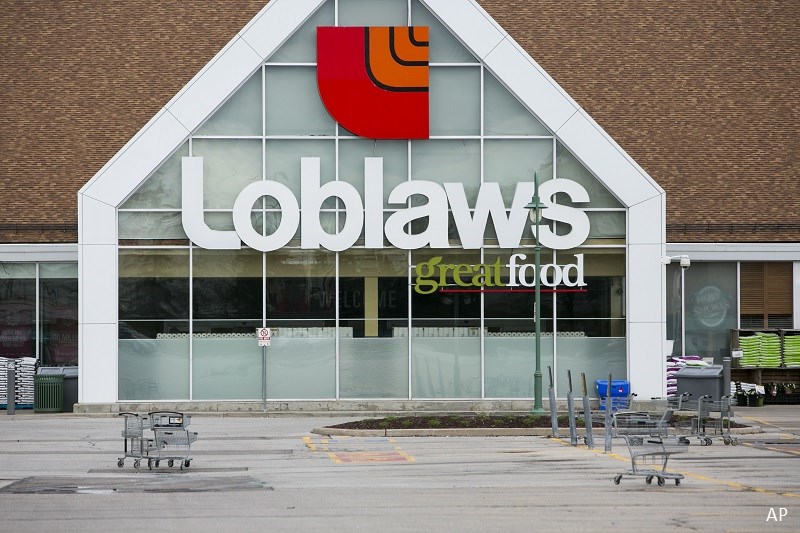
We have recently been talking about what we call anti-ESG (environmental, social and governance) shareholder proposals, disingenuously submitted by groups that oppose the work of “pro-ESG” investors,
less to offer a constructive path to change and more to disrupt a movement that is gaining steam. We also noted that one issue on which the two differing camps agree is forced labour, and specifically the treatment of the Uyghur people of the Xinjiang region of China.
This issue has cropped up in Canada as well. Shareholders at Canadian supermarket chain Loblaw Companies (L) allege that the company imported textiles from the Xinjiang region as recently as August 2021, and a 2021 CBC Marketplace investigation also found that Loblaw was selling tomatoes produced with forced labour. To address this, the B.C. General Employees’ Union General Fund (BCGEU) and the B.C. General Employees’ Union Strike Fund Shareholders request that Loblaw publish annually a summary of the results of its supplier audits.
BCGEU met with Loblaw in March about this, and was prepared to withdraw it's proposal if Loblaw agreed to make certain disclosures consistent with its peers, like Tesco, Gildan or Walmart. Loblaw replied that it was not yet ready to commit to specific disclosures at this time, and so the proposal was filed, and is going ahead for a vote on Thursday, May 5th at the Loblaw annual general meeting. The board of directors of Loblaw asks shareholders to vote ‘AGAINST’ the proposal. Shareholder proxy advisory firms Sustainalytics (a Morningstar company), ISS and Glass Lewis all recommend a ‘FOR’ vote in favour of the BCGEU proposal. Find out about the proxy voting process here.
It is important to remember, however, that a majority vote is unlikely in this case, irrespective of how many shareholders support the proposal. This is because the Weston family controls 53.5% of the votes at Loblaw, so without the support of the board and the management, the proposal will not get majority support. Read more about why dual share class structures might not be the best for investors here.
The BCGEU argues that the failure of Loblaw – Canada’s largest food retailer – in addressing the gap between its disclosure and that of its global peers leaves investors open to risk.
When confronted about labour risks around its supply chain in the past, Loblaw pledged a swift response. As BCGEU points out, in response to concerns about forced and child labour in cotton harvests, Loblaw committed to not source cotton produced in Uzbekistan, Turkmenistan in 2017, and in early 2021, it expanded that to include the Uyghur Region of China. But questions continue.
Allegations of a Recent Transaction
“According to shipment data compiled by Laura Murphy, Professor of Human Rights and Contemporary Slavery at Sheffield Hallam University in the UK, Loblaw imported textiles from the Uyghur region as recently as August 2021,” the proposal in the 2022 Management Proxy Circular points out.
“Despite its efforts, Loblaw is not without controversy," the proposal says, "The Corporate Human Rights Benchmark (CHRB) scored Loblaw poorly on human rights due diligence. Know the Chain has scored Loblaw poorly on traceability and supply chain transparency, supplier selection and monitoring disclosure."
"As part of their supply chain due diligence procedures, retailers across the globe (including Loblaw) conduct audits of suppliers. While Loblaw has begun disclosing the number of audits it conducts, its disclosure falls short of other large retailers," the proposal continues, "Both Walmart and Tesco disclose the number of audits conducted, as well as certain details on the results of those audits. Enhanced information on these audits would give investors key information to ensure that Loblaw’s enterprise risks are being managed and mitigated.”
Loblaw’s Says It Does Enough
The Board of Directors of Loblaw has asked shareholders to vote against this proposal, saying, in part that “Loblaw has a robust governance structure that ensures its programs, policies and practices are operationalized and effective. Oversight is provided at the senior executive level and includes a centralized Compliance and Ethics department that oversees regulatory compliance and ethics matters, as well as Social Impact, ESG, and Supply Chain Compliance departments. The Board of Directors, through the Risk and Compliance Committee, oversees Loblaw’s enterprise risk management process, regulatory compliance and ethics program, ESG activities, corporate policies and practices.”
The board further adds that Loblaw’s Supplier Code of Conduct (the “Code”) applies to domestic and foreign producers and manufacturers of Loblaw, as well as agents, brokers and other third parties who conduct business with Loblaw, and focuses on workers’ rights and protections within the supply chain, emphasizing the importance of protecting their human rights and providing safe working conditions. “This includes policies prohibiting child, forced and trafficked labour, as well as any discrimination, intimidation, abuse, harassment or violence against these workers. Further, the Code requires compliance with laws respecting workers’ freedom of association and right to collectively bargain,” it adds.
Finally, the company states that “While the Board of Directors recommends voting against the shareholder proposal, Loblaw acknowledges the importance of and is committed to increased transparency with regard to its supply chain and supplier audit process. Loblaw is one of the only Canadian retailers that proactively shares the names, addresses and countries of its apparel and footwear vendors. Loblaw also discloses the total number of audits conducted and intends to provide additional disclosure and transparency on this topic in its future ESG reports.”
Proxy Advisory Firms Side with Shareholders
Two of the main shareholder proxy advisory firms, ISS and Glass Lewis, agree with BCGEU and ask that shareholders vote in favour of the proposal.
Glass Lewis recommends that shareholders take a close look at proposals such as this to determine whether the actions requested of the Company will clearly lead to the enhancement or protection of shareholder value. “We believe that it is prudent for firms to actively evaluate risks to shareholder value stemming from global activities and human rights practices along entire supply chains. This evaluation is particularly important for those companies with operations in sensitive regions prone to allegations of human rights abuses. As has been seen with other companies, allegations of human rights abuses can inflict, at a minimum, reputational damage on targeted companies and may dramatically affect shareholder value,” the firm notes in its recommendation.
Glass Lewis adds that it believes best efforts should be put forward to identify and prevent risks to shareholder value stemming from human rights violations along its entire supply chain. “We are concerned that recent controversies could expose the Company to, at a minimum, reputational risk. Although the Company provides some information concerning its supply chain policies and considerations, we believe that the disclosure requested by this proposal could help paint a better and more granular picture of how the Company is monitoring and managing supply chain-related issues. Accordingly, we believe that support for this measure is warranted at this time.”
Meanwhile, ISS points out that to a considerable extent, Loblaw relies on the individual suppliers to ensure they and their own suppliers meet Loblaw’s Supplier Code of Conduct, and auditing is one of the tools used by Loblaws to ensure compliance.
“The number of audits conducted by Loblaws has gone up close to 40 percent since 2017. Disclosing information on auditing results would demonstrate that it is properly and rigorously addressing the risks and may also shed light on the functioning of the remedial mechanism. It would allow stakeholders to conduct better risk assessment. Agriculture is often related to child or forced labour. Grocers' relationship with the sector means they have a higher risk exposure. Responsible sourcing is increasingly important; disclosing the results of supplier compliance may be viewed favorably by many external stakeholders.
The company is already conducting audits. The resolution is requesting for additional information on what the company finds from their audits. In addition, the proposal itself is not too burdensome in scope and timeframe. It does not request a specific timeframe for commencement or specific contents in the summary report. As such, support is warranted at this time,” the ISS recommendation states.
Minority Support Not Equal To ‘Loss’
With Loblaw’s current voting and ownership structure, it is a foregone conclusion that any proposals that the board of directors, management and executives do not support, will not win a majority. It is an obvious question perhaps then: if the vote is doomed to failure, why bother filing at all? Because sometimes, you don’t need to win a majority share of a vote to ‘win’.
One way to look at it is that shareholder proposals help measure investor attitudes around key issues and are essentially a barometer for management.
"We believe it's critical as a responsible investor to engage with companies on ESG issues, even at controlled companies. It's an opportunity to engage in frank dialogue with the company, and for investors to have their voices heard. We look to the companies we invest in to manage their human rights risks, address their human rights impacts and provide adequate disclosure as a demonstration of strong risk oversight and sound corporate governance. The best outcome is that the company agrees to the disclosure we've asked for, and begins providing investors with critical information on supplier audits. If not, we will consider following up with the company and refiling the proposal next year if necessary," said Emma Pullman, Chief Stewardship Officer at BCGEU.
In 2019, BCGEU filed a proposal at Saputo (SAP) on food waste which did get a majority vote, but despite that, in 2020 the company released a comprehensive food waste policy that it said was inspired by the BCGEU shareholder proposal. Similarly, majority-controlled Thomson Reuters (TRI) has agreed to publish a human rights risk report and align with the United Nations Guiding Principles on Business and Human Rights (UNGPs) in response to BCGEU shareholder proposals in 2020, 2021 and 2022. The Thomson family controls 65% of Thomson Reuters votes.
At the end of the day, ESG investing and engagement is about negotiation and dialogue, and with each vote, the management teams gain insights into shareholder sentiment. Activist shareholders believe that if enough of the minority shareholders vote in favour of a resolution, it is enough for management and the board to take notice, and perhaps effect change. The change may not come this year, or even next, but eventually, it will.
























